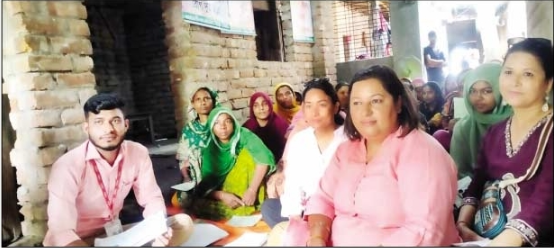A high-level Nepalese Delegation visited TMSS in Bogura from May 16 to May 18, 2025. The delegation included leading women media professionals. They came to observe TMSS’s development and service initiatives. They aimed to learn from TMSS’s impactful work in Bangladesh.
Purpose of the Visit
Ms. Laxmi Bhandari, Chairperson of Initiatives of Media Women (IMW), Nepal, led the visiting team. She was accompanied by Ms. Shiksha Bhandari, Senior Editor at Nepal National Television, and Ms. Kabita Kumari Adhikari, Chief Editor of Suchana Press. The team came to explore TMSS’s efforts in empowering marginalized communities. They focused on learning about TMSS’s work in poverty alleviation, women’s entrepreneurship, education, and healthcare services.

Key Areas of Focus
During their visit, the Nepalese delegation reviewed a range of TMSS programs, including:
- Microfinance initiatives: Observing field-level group activities and meeting successful small-scale entrepreneurs who have improved their economic conditions with TMSS support.
- Educational programs: Gaining insights into TMSS’s extensive education network, which currently includes 42 institutions across Bangladesh.
- Healthcare services: Touring TMSS’s renowned 1,000-bed TMSS Medical College & Rafatullah Community Hospital and the TMSS Cancer Hospital, both known for their affordable and inclusive care.
Remarks from the Delegation
Following their visit to the TMSS Cancer Hospital, the delegation expressed that the model could be highly beneficial for public health in Nepal, especially in cancer care and treatment. They appreciated the infrastructure, efficiency, and patient-centered approach of TMSS healthcare services.
Interview with TMSS Founder
The visit concluded with an exclusive interview with Prof. Dr. Hosne-Ara Begum, The Founder and Executive Director of TMSS. The Nepalese delegation lauded her visionary leadership and the organization’s ongoing efforts to ensure inclusive development for all.
Inspiration for Nepal
The Nepalese delegates shared their belief that TMSS’s journey—from grassroots mobilization to nationwide impact—could serve as a strong source of inspiration for NGOs, media houses, and policymakers in Nepal.




